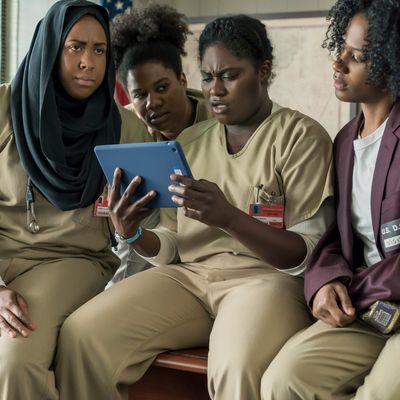
After the chaos and confusion of the premiere, “F*ck, Marry, Frieda” offers more of the same but with less impact. Thankfully, it’s all held together by a very strong through line involving Frieda. The episode begins with a flashback — part of OITNB’s wheelhouse of narrative tricks that hasn’t gone away given the new mostly real-time structure of the season — to when Freida was a young girl in the Nature Scouts. Their motto? “Ready for any and all things.” Frieda took that very seriously, encouraged by her Cold War conspiracy theorist father who taught her how to be a survivalist. Now she’s caught in the midst of a prison riot, ready for any and all things.
In the last episode, Frieda got locked in the kitchen pantry along with the white nationalist crew. Over the course of the episode, she uses random pantry tools to fashion two blow darts that she uses on the guards — who locked themselves in the kitchen — and then she convinces them they’re laced with wolfsbane. The guards fall for her lie and let them out of the pantry, and the inmates swiftly overtake them and send them to join the rest of the hostages in the chapel.
The goings-on at the chapel are where things start to fall apart. Maria Ruiz is in her element, leading a “reorientation” for the inmates in which she and her crew subject the captured guards to the same cruelties they experienced. She has them all strip down, and they even perform a search of one guard’s anal cavity, which is incredibly difficult to watch. Ruiz’s retributive justice isn’t one bit empowering or cathartic, and maybe that’s the point. But if so, we’re being asked to root against the inmate insurrection, which is another issue entirely. Although Orange Is the New Black has always been about presenting people as neither wholly good nor wholly bad, it’s still a strange narrative choice in the context of this riot being a response to an act of police brutality against an inmate. Alex stands up to Maria, saying that what they’re doing is wrong, acting in a way as an audience surrogate, but even that’s a weird choice for this particular character.
The most grounded part of the story remains Taystee, Black Cindy, Alison, and Watson’s attempts to get the word out about Poussey’s murder. Waiting for the video to gain traction, they discover that someone on the internet has turned Black Cindy sipping on her drink in the background of the video into a meme called Black Lattes Matter. Cindy, Alison, and Watson are incredulous and a little confused, feeling behind on the times since being locked away from the outside world. Taystee is inconsolable. She’s devastated that no one cares, that a crime has turned into a pointless joke. It speaks to how the internet isn’t always a useful tool for justice — sometimes, it’s a black hole of irony and people using the pain of others to make a joke.
Meanwhile in medical, Suzanne and Maureen wonder if they’re possibly in limbo and wind up having an in-depth conversation with Humps about historical methods of killing someone. These scenes reiterate how depraved a person Humps is, but they seem to be aiming for dark humor and falling flat. Even the reveal that Maureen added oxygen bubbles to Humps’s IV so that he’ll have a stroke doesn’t really surprise.
A breathing yet unresponsive Humps is brought to the chapel, along with Caputo and Josh the PR guy, whom Taystee and the crew reluctantly give up in hopes of unifying the prison behind one organized message. With the hostages all assembled, Taystee snaps a picture and the inmates officially have their leverage. Again, it’s difficult to see how OITNB could possibly dig itself out of this riot situation in a coherent and meaningful way. The chaos is definitely part of the story at the moment, and at least this episode is anchored by the Frieda flashbacks, which keep it from feeling too much like the premiere. Those flashbacks are some of the best parts of the episode, visually compelling and specific, getting into young Frieda’s head in a way that contextualizes the present. Sure, it’s narratively convenient that Frieda has a background in survival skills, but it still works. In Litchfield, Frieda’s background leads her to construct a bunker of sorts that makes her the most equipped to survive the new conditions at the prison.
The riot has everyone grasping for power. Daya had the upper hand when she still had the gun, but she was never ready nor willing to be the leader of this uprising. She lost the gun at the end of the premiere — though we still don’t know to whom — and people are gradually finding out. Ruiz is on to her, and there has been a look in several other characters’ eyes suggesting that they know. Daya tells the truth to two of her friends, who reassure her by pointing out, “We’ve all pretended to have a gun we don’t have.” They mean this literally, but it also works figuratively: The illusion of power is sometimes as effective as actual power. But individuals scrambling for control is no way to run an effective movement, and until all the inmates finally piece that together, Litchfield will remain discordant.

